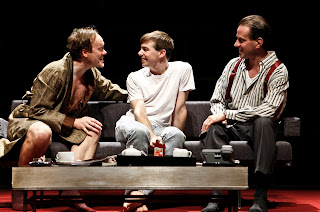FILM: War Horse
[Note: War Horse releases in theaters on 12/25. It's the perfect holiday film, notwithstanding the graphic war-scenes, so you might consider buying your tickets now, especially if you liked the stage version, which this one-ups in just about every way possible.]
I felt as if I was one of the few people to find the Lincoln Center production of War Horse to be overhyped: never able to forget that I was watching elegant and impressive puppets, even at the moments of greatest drama, the constant thought racing through my mind was, "This would make a mighty impressive movie." I feel vindicated now, having caught a screening of Steven Spielberg's adaptation of War Horse: there's a scope in the war scenes (comparable to those of Saving Private Ryan, although there's nary a splotch of blood in this PG-13 family film) and a tenderness in the close-up focus on the reflection of a little girl in a horse's eye that the play cannot achieve.
At the same time, however, the novel (which was originally in the first-person perspective of the horse) is less well-adapted by screenwriters Richard Curtis and Lee Hall than by playwright Nick Stafford. For one, Albert Narracott (Jeremy Irvine) and his horse, Joey, now seem more star-crossed than ever: the film opens with lush, long shots of the green Devon landscape (which will later be contrasted with the tight, muddy grey ones of a war-torn France), as Albert watches the miracle of life: Joey's birth. When Albert's father, Ted (Peter Mullan), picks him up at auction, however, it's because his landlord (David Thewlis) is bidding for him, a rivalry that makes far less sense than the play's choice to make this his successful brother, the one who chose not to fight in the Boer War that has turned Ted into such a bitter drunk, love of his wife Rose (Emily Watson) aside. Likewise, when Joey's sold off to the British military at the start of World War I, it's not as much of a betrayal from father to son as it is a necessity of repaying a mortgage.
These changes make the opening "act" less tight, just as the scenes in France sometimes wander too aimlessly over the bizarre chances in which both Joey and his "friend," the black stallion Charcoal (inexplicably renamed from Topthorn in the book and play), dodge disaster time and again. It's nice to see the variety of people affected by war -- the dashing British commanders who are out-thought by their "crude" German rivals, the German brothers who desert in order to fulfill an oath to their family, the fragile French girl and her doting grandfather who are glad to have a moment of brightness in their occupied life -- but this isn't the film for it. The focus is best left on Albert, Joey, and the horrendous things that happen around them: Spielberg is too happy to trot about the scenery, though he's best at a brisker pace.
Just look at those "brisk" and agonizingly terrific final forty minutes. They're full of holiday miracles and tear-jerking presents in which Joey drags artillery, faces down a tank, and deals with barbed wire, while Albert -- who, in a smart although obvious edit from the screenwriters, has enlisted since we last saw him four years ago -- finds himself facing the other end of that artillery, the dangerous trenches, and the deadly gas warfare. It's more visceral than the theatrical production, and the stakes are higher, and yet the emotions are the same, which speaks well to the humanizing effects from the play's Handspring Puppet Company. Still, it's Spielberg's production that wins out: some horrors are impossible to imagine, and the realism of the film's war scenes -- fields scattered with the corpses of horses and their riders, bones shattering under the stress of such constant toil -- makes it unnecessary to imagine, only difficult to watch.
I don't imagine it will be possible to overhype this production of War Horse, a shoo-in for Academy nominations in all categories except those for acting (and that's no offense to Irvine, Mullan, the excellent Watson, and spot-on villain Thewlis, but this isn't really about them). Striking both visually and emotionally, and with only a few issues with pacing along the way, it's a great achievement (especially for an adaptation) for Spielberg, whose inclusive scope even manages to find a comic place for a belligerent duck.


















